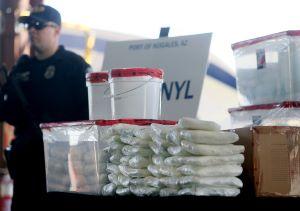Marijuana Policy
A bill toughening penalties for hard drug sales is moving in Ohio, Thailand clears the way for the medical use of opium and magic mushrooms, and more.

A coalition of Democrats called on the Drug Enforcement Administration (DEA) to quickly remove marijuana from Schedule I of the Controlled Substances Act (CSA), signaling impatience over the agency's ongoing review of cannabis's designation.
The lawmakers were led by Sens. Elizabeth Warren (MA) and John Fetterman (PA) and Reps. Barbara Lee (CA) and Earl Blumenauer (OR) in a letter addressed to Attorney General Merrick Garland and DEA Administrator Anne Milgram.
"We are now nearing eight months since the Department of Health and Human Services (HHS) recommended rescheduling marijuana to Schedule III -- and 18 months since President Biden directed HHS and the Department of Justice (DOJ) to begin the process of reviewing marijuana's scheduling. It is time for the Drug Enforcement Administration (DEA) to act," the lawmakers wrote.
The letter was the joint project of Sens. Elizabeth Warren (D-MA) and John Fetterman (D-PA) and Reps. Barbara Lee (D-CA) and Earl Blumenauer (D-OR). Other senatorial sign-ons came from Sen. Bernie Sanders (I-VT), Cory Booker (D-NJ), Kirsten Gillibrand (D-NY), John Hickenlooper (D-CO), Jeff Merkley (D-OR), Alex Padilla (D-CA), Chuck Schumer (D-NY), Peter Welch (D-VT), and Ron Wyden (D-OR).
House Democrats who added their names to the letter were Reps. Robert Garcia (CA), Jan Schakowsky (IL), Dina Titus (NV), Val Hoyle (OR.), Becca Balint (VT), Jim McGovern (MA) and Katie Porter (CA), as well as Del. Eleanor Holmes Norton (DC).
"While we understand that the DEA may be navigating internal disagreement on this matter, it is critical that the agency swiftly correct marijuana's misguided placement in Schedule I," they wrote. "We trust that the DEA is working as quickly as possible toward a decision on how marijuana is scheduled, as Vice President Kamala Harris recently reassured stakeholders."
"We are also hopeful that the DEA will not make the unprecedented choice to disagree with HHS's medical finding that a drug does not belong in Schedule I," they added.
Drug Policy
Biden Signs Bill Targeting Fentanyl Makers and Sellers. President Biden on Tuesday signed into law the Fentanyl Eradication and Narcotics Deterrence (FEND) Off Fentanyl Act (S. 1271) just hours after it passed the Senate.
The Senate had originally passed the bill in July 2023 and again in February 2024, but had to return for a final concurrence vote after companion legislation passed the House last week.
According to Sen. Bob Casey (D-PA), one of the co-sponsors of the bill, "the bill will enhance current law so US government agencies can more effectively disrupt illicit opioid supply chains and penalize those facilitating the trafficking of fentanyl. It also ensures that sanctions are imposed not only on those engaged in the illicit drug trade, but also in the money laundering that makes it profitable."
The congressional summary of the bill says: "This bill requires that the sanctions specified in Executive Order 14059 (relating to sanctions on foreign persons involved in the global illicit drug trade), as well as any amendments to or directives issued pursuant to that executive order before the date of the enactment of this bill, shall remain in effect."
"The bill also requires the President to impose property-blocking sanctions on any foreign person knowingly involved in (1) significant trafficking of fentanyl, fentanyl precursors, or other related opioids including such trafficking by a transnational criminal organization; or (2) significant activities of a transnational criminal organization relating to the trafficking of fentanyl, fentanyl precursors, or other related opioids."
"The Department of the Treasury is authorized to take certain actions relating to financial institutions, classes of transactions, or types of accounts that (1) involve a non-U.S. jurisdiction, and (2) are of primary money laundering concern in connection with illicit opioid trafficking. For such institutions, transaction classes, or account types, Treasury may require domestic financial institutions to (1) take certain special measures, (2) prohibit certain transmittals of funds, or (3) impose conditions on transmittals of funds."
"Treasury's Financial Crimes Enforcement Network must issue guidance to US financial institutions for filing reports of suspicious transactions related to suspected fentanyl trafficking by transnational criminal organizations."
Ohio House Passes Bill Imposing Harsher Drug Trafficking Penalties. The House on Wednesday overwhelmingly approved a bill boosting penalties for human and drug trafficking, House Bill 230. The measure passed on a vote of 79-13.
A proposal to boost the penalties for human and drug trafficking cleared the Ohio House on Wednesday by a 79-13 vote.
Sponsored by Reps. Cindy Abrams (R-Harrison) and DJ Swearingen (R-Huron), the bill would recategorize the felony classifications for trafficking certain amounts of drugs, such as cocaine, fentanyl, or heroin. Harsher penalties come with the state’s potential reclassifications.
Trafficking more than one gram of fentanyl, for example, would go from a fifth-degree felony to a third-degree felony. That would shift the range of maximum sentences from one year to three years.
"Our message is clear: If you want to traffic illegal drugs or humans, you better not come to Ohio," Abrams said in her floor testimony.
But the Legislative Service Commission's fiscal analysis of the bill estimates that passage of the bill would mean state prisons would have to add 1,300 to 1,500 more beds.
The bill now heads to the Senate.
International
Thai Health Ministry Approves Medical Uses of Opium, Magic Mushrooms. A directive from Health Minister Cholnan Srikaew published in the Royal Gazette has moved opium and psilocybin mushrooms to Category 5 of the country's drug schedule, meaning they are now approved for medical use.
The directive clarifies that all Category 5 drugs except for marijuana and hemp extracts are approved for medical use and research.
Srikaew made the change by activating Article 24 and Article 58 of the Narcotics Code.
Add new comment